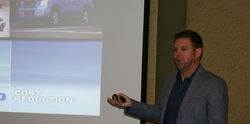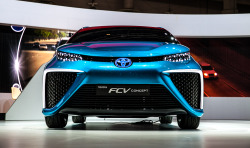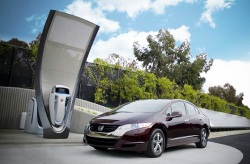Company Loves Its Hybrids But Likes Hydrogen Better Than Electricity
The race to provide the car of the future is heating up and it should surprise no one that one of the world’s largest car companies, Toyota, is right in the middle of chase to provide it. For Toyota, that future car is powered by a fuel cell that produces electricity on-board from hydrogen.
Craig Scott, Toyota’s national manager of advanced technologies, brought that message recently to a meeting of the Western Automotive Journalists, a Northern California-based group of auto writers.

Scott’s message was clear–the car’s are real, they’ll be on sale next year and they will deliver what consumers want in a car while helping the automaker to meet tightening emissions regulations around the globe. Toyota’s fuel cell story is in sync with its competitors Hyundai and Honda, who are also ready to enter the market, as well as other companies that will follow–Daimler/Mercedes, Ford, Nissan, General Motors and BMW. The cars will offer a range comparable to gas models and a similar fill up time (both advantages cited for offering a fuel cell electric car as opposed to a battery electric one). The catch, of course, is where those fill ups will take place. As Scott reported, the state California has dedicated $20 million a year for the next decade to put 100 stations in place, augmenting the meager network of nine that exist right now.
Because fuel cell vehicles have no emissions of either criteria pollutants or greenhouse gases (GHG), they fit California’s quest for zero emission vehicles and help the automaker meet U.S. federal and other countries’ goals for reduced GHGs.
Zoomy Concept Shown
The concept fuel cell FCHV (for Fuel Cell Hybrid Vehicle to remind of Toyota’s bread-and-butter advanced technology) sedan Toyota has been showing was unveiled at the Tokyo Auto Show last year and most recently showed up at the Consumer Electronics Show in Las Vegas. Scott indicated that next year’s production car would use the zoomy styling of the concept, though not all of the details of the show car would make it to the street. Costs of the fuel cell “engine” hardware have dropped significantly in the last few years, Scott said, meaning the cars that go on sale in 2015 may still be more expensive than their petroleum-powered cousins, but they won’t cost automakers the $1 million the prototypes did during the past decade. Costs and prices are expected to drop further as production volumes ramp up in the 2020s and other advances in technology, such as reducing the amount of exotic metals like platinum, come on board.

The advances and volumes are expected to come not just because consumers are expected to snatch up great numbers of fuel cell cars when they get to the market, but because automakers have banded together to share costs and collaborate to move the technology forward. Toyota is working with BMW, Ford, Daimler and Nissan are working together, GM and Honda have formed an alliance while Hyundai is going it alone and Fiat-Chrysler appears to be sitting out this round.
The Market Begins
Although both Honda and Mercedes have been leasing limited number of their fuel cell cars for a couple years, Hyundai will be the first on the retail market with a real push. Michael O’Brien, Hyundai’s vice president of corporate and product planning, told the Governor’s Office Summit on Zero Emission Vehicles (March 7, 2014) that the first load of Tucson FCEVs (Hyundai uses the more conventional Fuel Cell Electric Vehicle nomenclature) will ship from Korea in 3-4 weeks, arriving in April and going on sale mid-May at four dealerships in Southern California. Hyundai previously announced it would offer a $2,999 down, $499 lease that includes free fuel and maintenance for the three years of the lease. Hyundai’s also going to make the Tucson FCEV available for rent through Enterprise Rent-a-Car.

Scott said Toyota isn’t ready to talk pricing on its fuel cell sedan, but it can be expected to be competitive. We’ve seen the same dynamic at work in the electric car space, where the limited market has driven all the automakers to offer very similar discounted leases. Toyota executives have also said they will approach their fuel cell vehicles with the kind of patience they showed with the Prius hybrid introduction. That technology took almost a decade before it took hold in the market, but Toyota has said they’re in it for the long haul and will be able to continue investing in the technology until the market catches up with it.
Taking a page from the Tesla playbook, Scott also said Toyota is planning to augment any public hydrogen stations with a network of its own, which may be a key way of reassuring new buyers that they will be able to refuel. In the same vein, Honda recently demonstrated a quick refueling station that reduces the fill time to about three minutes, more than comparable to the time spent with a gas or diesel car.
While Toyota and Honda both showed off concept versions of their upcoming fuel cell cars, Hyundai introduced theirs as a Tucson-based model, virtually indistinguishable from the gas version except for badging. Hyundai corrected that by introducing the Intrado FCEV concept at the Geneva Auto Show.
Expect the drumbeat of fuel cell announcements to continue through the year as automakers gear up for more of the cars appearing on the market. Much of the news will be California-centric, but other centers of fuel cell infrastructure and vehicles can be found in Germany, Japan and Korea with England, Denmark and Singapore also in the mix.
Story by Michael Coates; photos by Michael Coates & the manufacturers
Published March 8, 2014
Related stories you might enjoy:
Hydrogen Fuel Cell Cars Go On Sale In 2014
Cars & Technology of the Future
Suddenly, Hydrogen Cars Are Back

0 thoughts on “Toyota is “all in” on fuel cell electric vehicles”